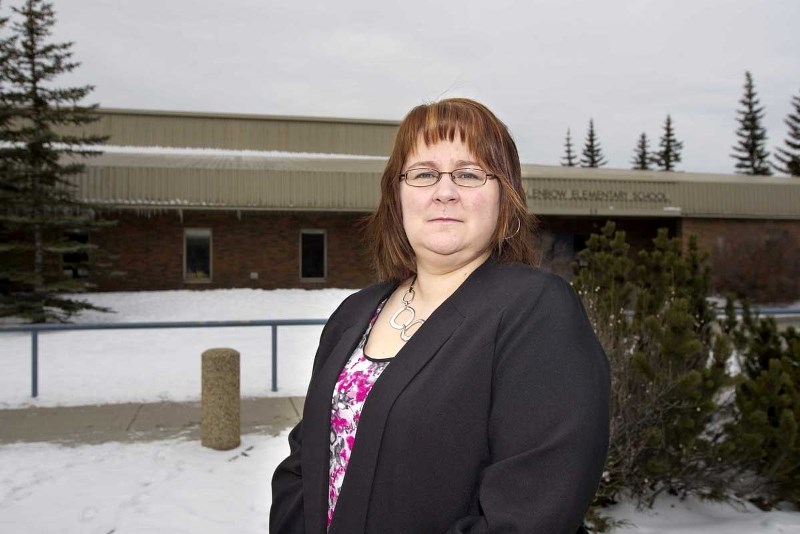The recent backlash from the media, advocacy groups and the Wildrose Party over Alberta’s current math curriculum, labeled ‘discovery math’, has cast a questionable shadow over the coming entire curriculum overhaul slated for March 2016.
The recent backlash from the media, advocacy groups and the Wildrose Party over Alberta’s current math curriculum, labeled ‘discovery math’, has cast a questionable shadow over the coming entire curriculum overhaul slated for March 2016.
Angela Irons is a Cochranite, parent and director for Parents for Choice in Education (PCE) who is concerned about the current math curriculum and the coming overarching ‘Inspiring Education’ concept that will shape the entire future provincial school curriculum.
The PCE is a non-profit advocacy group whose mission is to ‘advocate for an excellent, quality-oriented and choice-driven education system which recognizes parental authority.’
Irons said her group has received overwhelming concerns expressed by parents from across the province that the current math curriculum, which was officially implemented in 2008, simply ‘isn’t cutting it’.
“People are very concerned, especially about ‘discovery math’, ” said Irons. “It seems to be administration who are saying it’s great, but parents seem to be saying it’s not working. ”
Dr. Nhung Tran-Davies, a mother of three who lives in Calmar, east of Leduc, Alta., has an online petition with over 12,000 signatures from parents across the province who want the government to re-focus the math curriculum on traditional math concepts.
“The philosophy behind (discovery math) is if you teach the student four to five strategies, the child will choose the best strategy, ” said Tran-Davies of the concept of this ‘inquiry-based learning’, which she refers to as ‘convoluted’ and ‘over-complicated’.
“Most kids do excel with direct instruction…our focus is to re-focus so that inquiry-based learning can become a part of Inspiring Education - but if it becomes the central focus, our children will be lost. ”
Irons said this inquiry-based learning is a concept that likely only works for some kids and it shouldn’t be the overarching principle of how to teach kids math, as it’s confusing, overwhelming and it takes away from the basics.
Both Irons and Tran-Davies emphasized that most kids just want to know the answer and the most direct method to get there.
The concept of Inspiring Education is based on teaching children to become engaged thinkers, ethical citizens and entrepreneurial spirits.
Part of the concept is a focus on individuality and teachers as facilitators or ‘learning architects’ rather than instructors.
Over the next year, educational partners will be permitted to make a greater contribution to the curriculum overhaul through a ‘prototyping phase’ that embodies the concepts of Inspiring Education.
The province would then create the new curriculum based on the best of these prototypes.
Minister Jeff Johnson has been under fire recently for not collaborating better with parents, educators and math experts.
In a recent interview with the Eagle, Johnson said Inspiring Education does not take away from the basics, including numeracy and literacy skills.
“Our kids are not stepping back into a back to basics world…it’s about motivating the kids and using that as a tool. ”
Johnson emphasized that the new model would strike a better balance between modern learning tools and techniques and the fundamentals.
He highlighted improved coordination of subjects, more individuality, less false barriers, dual crediting (high school to post-secondary) and better preparation for the future.
Dave Morris, assistant superintendant of learning with Rocky View Schools (RVS) has been an educator for 30 years.
Morris said he is concerned with the media dubbing the current math curriculum as ‘discovery math’ and the misconceptions associated with it.
He also said that through the coming curriculum overhaul, the current math curriculum would be a part of that; the prototypes would look at improvements to math, science, social studies, language arts, arts education and wellness education.
“What Alberta Education wants is everyone’s voice…the general community, post-secondary institutions, businesses, ” said Morris, adding that parents should not fear that the new model is based on zero direct instruction and that the current math curriculum is providing a “deeper understanding of math ”.
Johnson addressed the declining Alberta scores on PISA’s (Program for International Student Assessment) international math test and PAT (Provincial Achievement Test) exams at the 2014 Rural Education Symposium held in Canmore March 14.
Johnson said at the symposium that today’s scores show that kids are ranking higher than adults and that the “slight trend down ” is impacted by a variety of factors, including Alberta’s explosion in (international) growth, asserting that Alberta’s students are ranking high on a global scale.
But Tran-Davies and Irons ascertain this isn’t just about putting the times table back into the curriculum - that it’s time for the province to re-focus the curriculum back to the basics first, inquiry-based learning principles second and that the key lies in the province’s ability to listen to parents across Alberta.
